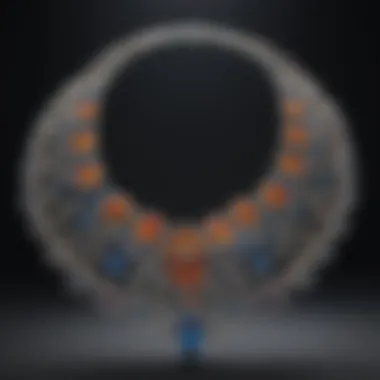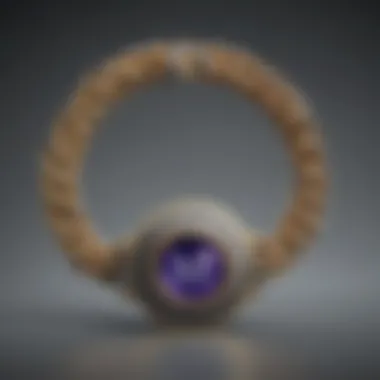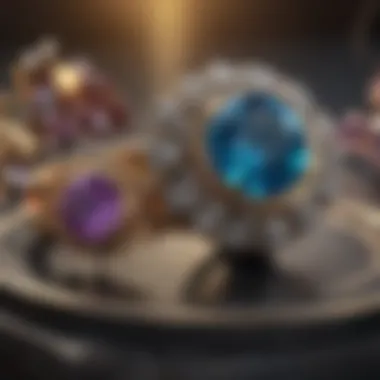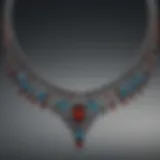Mothers Day Jewelry: Personalization and Meaning


Intro
Selecting jewelry as a Mother’s Day present can feel overwhelming. Often, it is not just about the piece itself; it's about the story behind it. Jewelry can encapsulate emotion, memory, and personal significance. Thus, understanding the elements that make jewelry meaningful becomes critical for a thoughtful gift.
In this exploration, we will delve into the intricate world of gemstones and minerals, essential components in the jewelry-making process. Themes will include a brief history of gems, cultural significance, and the methods for evaluating and caring for these precious stones. Each aspect plays a role in selecting a piece that truly honors the maternal figure in one's life.
Overview of Gemstones and Minerals
Jewelry has a long-standing association with gemstones and minerals. Historically, gemstones have not only been appreciated for their beauty but also revered for their perceived magical and healing properties. Across cultures, they have symbolized power, love, and even immortality.
In various societies, gemstones were believed to hold the essence of the earth. Their colors, shapes, and associations have woven deep-rooted traditions. From the ancient Egyptians who adorned themselves with lapis lazuli to modern beliefs surrounding birthstones, the significance of these minerals fluctuates, yet remains ever-present.
Gemstones and minerals represent more than just adornment; they encapsulate stories, legacies, and the connections we share with those we hold dear.
Historical Context of Gemstones
The use of gemstones can be traced back thousands of years. From the intricate carvings of ancient civilizations to their incorporation into crowns and regalia, their symbolism has evolved yet remained poignant. In many cases, specific gemstones have been linked to protection or good fortune, especially in traditions of various cultures.
Significance in Culture and Society
Different cultures attribute unique meanings to each gemstone. For example:
- Diamonds symbolize eternal love and are commonly associated with engagements.
- Emeralds are linked to fertility and rebirth in some traditions.
- Pearls signify purity and are often given at significant life events.
Understanding these implications can profoundly influence your selection for a Mother’s Day gift, enhancing the emotional weight of your present.
Gemstone Formation and Properties
Gemstones undergo a fascinating formation process that includes various geological activities. Understanding the science behind this can deepen your appreciation for these natural wonders.
Formation Process of Gemstones
Most gemstones are formed under specific temperature and pressure conditions, turning simple minerals into stunning jewels. While some emerge from volcanic activity, others crystallize deep within the earth over millennia. Each gemstone type has a unique origin story worth noting.
Properties that Define Gemstones
Key properties include:
- Color: The hue of a gemstone can dictate its desirability and market value.
- Hardness: Measured on the Mohs scale, this property affects durability and usage in jewelry.
- Luster: This is the sheen a gemstone exhibits, which greatly impacts its visual appeal.
Classification based on Color, Hardness, and Luster
Classifying gemstones can simplify the selection process. For example,
- Precious stones like diamonds, sapphires, rubies, and emeralds are highly valued.
- Semi-precious stones, while beautiful, typically lack the same market value.
Familiarizing yourself with these classifications can assist in making an informed decision for Mother’s Day gifts.
Identifying and Evaluating Gemstones
Knowing how to assess gemstones is crucial. Several factors affect their value, and understanding these can guide your purchasing choices.
Factors Affecting Gemstone Value
Consider:
- Origin: Some locations yield higher quality stones than others.
- Clarity: A clearer gemstone generally possesses greater worth.
- Cut: The craftsmanship of a cut impacts how light interacts with each stone, influencing its beauty.
Techniques for Gemstone Identification
Identifying gemstones can be accomplished through various methods, including visual inspection under a jeweler’s loupe and specific tests for hardness. Understanding how these stones are categorized ensures you can select a reputable piece.
Assessing Gemstone Quality
The quality of a gemstone is ultimately what affects its overall market value. Factors mentioned previously come into play, but learning to distinguish between stones can empower buyers.
Caring for Gemstones
Maintaining the quality of gemstones cannot be overlooked. Proper care aids their longevity, ensuring they can be enjoyed for generations.


Cleaning and Storing Gemstones Properly
Regular cleaning is vital. Gentle soap and water typically suffice. Storage should occur in a way that prevents scratches. This often means using soft cloths and individual compartments.
Avoiding Common Mistakes in Gemstone Care
Avoid exposing gems to harsh chemicals, and refrain from wearing them while engaging in physical activity.
Preservation Tips for Specific Gem Types
Different gemstones have unique care needs. For instance, opals should not be exposed to extreme dryness, while harder stones like diamonds need less frequent special care.
Intro to Mother's Day Jewelry Gifts
The act of gifting jewelry on Mother's Day holds deep significance for many. Jewelry is not merely an adornment but a powerful symbol that conveys feelings too often unexpressed through words. Consequently, selecting jewelry as a gift enhances the emotional weight behind the act, making it a thoughtful and cherished choice.
One cannot ignore the various benefits that jewelry presents as a Mother's Day gift. First, it serves as a lasting reminder of affection and appreciation. Unlike other gifts that may fade or lose value over time, quality jewelry often appreciates in sentimentality and market value. Mothers can wear these pieces daily, allowing the memories associated with the gift to remain alive.
Consideration should also be given to the sheer variety in jewelry options available today. Whether it's a delicate necklace from Tiffany & Co. or a meaningful gemstone piece from Pandora, the selections are vast. Such diversity ensures individuals can find something uniquely suited to their mothers' tastes and styles. The essence of personal connection can be amplified through jewelry that matches her life story or personality.
Above all, there's a traditional aspect to gifting jewelry. Many associate special occasions with the adornment of precious metals and stones. This age-old custom reflects a broader cultural approach to valuing sentiment, permanence, and beauty.
Choosing jewelry for Mother's Day is not simply about the physical item but about crafting a memory that resonates personally. One must think thoughtfully about how a piece could tell a story or symbolize a shared experience, making it extraordinarily unique. Ultimately, this section lays down the groundwork to further explore the cultural and emotional aspects, various types and styles of jewelry, the significance behind gemstones, and ethical considerations that make the experience of gifting jewelry for Mother's Day truly meaningful.
The Emotional Importance of Jewelry
Jewelry often plays a crucial role in expressing feelings and making connections, especially on sentimental occasions like Mother's Day. The choice of jewelry as a gift carries more than just aesthetic appeal; it represents love, gratitude, and appreciation. By choosing the right piece, one can convey emotions that words might fail to express. Jewelry can bridge generational gaps, serving as a legacy that connects mothers and daughters through shared experiences. This section explores two significant aspects: the symbolism and sentimentality of jewelry, and its potential to create lasting memories.
Symbolism and Sentimentality
Jewelry is inherently tied to personal narratives and cultural histories. Each piece can symbolize unique experiences or significant life milestones. For example, a locket may represent cherished memories, while a birthstone ring can embody family bonds and heritage. The emotional aspects of giving jewelry tap into deeper meanings beyond mere materialism.
When gifting jewelry to a mother, it is essential to consider the symbolism associated with various gemstones and designs. A necklace with an infinity symbol denotes everlasting love, while a charm bracelet can represent specific memories shared between mother and child. These choices are steeped in thought and intention, enhancing the sentimental value. Gifts like these become emblematic of the relationship, reflecting care and understanding.
"Jewelry is not just an ornament; it tells a story that words may not capture."
Creating Lasting Memories
The act of gifting jewelry often becomes a memorable event in itself. It is not just about the item; it is also about the occasion and the emotions tied to it. When someone presents jewelry, it often creates a moment frozen in time that resonates deeply. Mothers can look back on that specific moment when they received a bracelet or a pair of earrings, recalling the love and effort behind the gift.
Moreover, jewelry can serve as a reminder of what someone holds dear. Wearing a piece of jewelry can invoke memories from the past, reminding the wearer of significant events or feelings. For instance, a mother might cherish a necklace gifted on her birthday, recalling the joy of the occasion every time she puts it on. This continuous connection makes the jewelry not just an ornament but a vessel of memories.
Types of Jewelry for Mother's Day
Jewelry has always played a special role in expressing sentiments and enhancing personal style. When it comes to Mother's Day, choosing the right piece can convey deep affection and appreciation. In this section, we explore various types of jewelry that make thoughtful gifts. Each selection holds its unique charm and significance, allowing you to convey your feelings in a lasting manner.
Necklaces and Pendants
Necklaces and pendants are a classic choice for Mother's Day gifts. They serve not just as accessories but as meaningful tokens that can embody cherished memories or shared experiences. A simple yet elegant pendant can feature a birthstone or an engraving, personalizing the gift further.
Benefits of Necklaces:
- Versatility: Suitable for both casual and formal occasions.
- Customizable: Engravings or gemstone choices can reflect personal stories.
- Timeless: They have enduring appeal, suitable for all ages.
Bracelets
Bracelets add a personal touch to a Mother's jewelry collection. They can signify unity, love, or even significance of family bonds. Charm bracelets, in particular, allow each charm to represent a milestone or trait significant to the recipient. Over time, these charms can be added, creating a story in itself.
Considerations with Bracelets:
- Fit: Make sure to find the right size so it is comfortable.
- Style Matching: Think about the recipient's personal style to ensure it complements their wardrobe.
- Occasion Flexibility: Perfect for daily wear or special events.
Earrings
Earrings are often more than simple accessories; they draw attention to the face and can enhance overall elegance. From studs to dangles, earrings allow endless possibilities for personalization. A pair of pearl earrings is sophisticated yet simple, while gemstone accents can add color and uniqueness.
Reasons to Choose Earrings:
- Variety: Multiple styles including hoops, studs, and drops.
- Accessibility: Generally easier to pick since they suit almost everyone.
- Instant Appeal: Can enhance any outfit, making them a sure choice.


Rings
Rings carry substantial symbolism, often linked to commitment and memory. A ring can serve as a significant keepsake, reminding the wearer of special moments. Stacking rings are prevalent, allowing combinations that express personal taste or significant dates.
Key Points about Rings:
- Meaning: Often represents connection or love, making it ideal for Mother's Day.
- Size: Make sure to know the ring size to ensure a perfect fit.
- Design Variety: Options range from simple bands to intricate designs.
Choosing the Right Gemstone
Choosing the right gemstone is a paramount aspect when selecting jewelry for Mother's Day. The choice of gemstone can reflect personal sentiments, cultural values, and aesthetic preferences. Each gemstone carries its own significance and can deliver messages that go beyond mere beauty. This section will delve into the elements that make gemstone selection crucial, the benefits it can bring to the gifting experience, and other essential considerations.
Choosing the appropriate gemstone allows for a deeper connection with the gift. For example, pairing a mother's birthstone with her child's engraving can create a unique blend of personal and familial ties. This idea reinforces the bond between mother and child while also offering a memorable piece of jewelry. Consequently, the right gemstone not only enhances the visual appeal but also adds layers of meaning that can resonate for years to come.
Furthermore, understanding the characteristics of various gemstones can guide the selection process. Factors such as durability, color, clarity, and price can influence a buyer’s choice. Evaluating these aspects can help in finding a gemstone that fits the recipient's lifestyle and preferences. More than just a commodity, gemstones are symbols of love and appreciation.
Birthstones and Their Significance
Birthstones hold a special place in jewelry gifting, particularly for Mother's Day. Each month is associated with a specific stone, believed to hold unique powers and attributes. For instance, the birthstone for April is the diamond, symbolizing strength and clarity, while the birthstone for June is pearl, signifying purity and harmony.
The significance of birthstones can vary. Many view them as a form of personal expression. When gifting a piece with a birthstone, it conveys thoughtfulness and intimacy. It shows that the giver has taken the time and consideration to know what is meaningful to the recipient. These stones are often more than just adornments; they represent foundational dates and milestones in an individual’s life.
"A birthstone serves as a reminder of significant moments and personal achievements, offering an emotional value that standard gemstones may lack."
In addition, many cultures attribute different meanings to each birthstone. These meanings may range from protective qualities to enhanced luck and prosperity. Understanding the significance can enhance the emotional value of the gift.
Meaning Behind Different Gemstones
Besides birthstones, many gemstones possess intricate meanings that can add depth to jewelry gifts. For example, sapphires, often associated with wisdom and nobility, can serve as a fitting gift for a mother who has been a guiding force in her child’s life. Likewise, rubies symbolize love and passion, embodying the affection between mother and child.
When selecting a gemstone for Mother's Day gifts, considering its meaning can enhance the overall experience. Some gemstones are believed to carry healing properties. For instance, amethyst is thought to promote calmness and balance. Choosing such stones not only shows appreciation but also reflects an understanding of the recipient’s personality or life circumstances.
In summary, the choice of the right gemstone is critical when selecting Mother's Day jewelry. Whether it's through birthstones or the inherent meanings of different gemstones, these selections serve a greater purpose. They establish connections, enhance emotional ties, and ultimately create lasting memories.
Personalization in Jewelry Gifting
The concept of personalization in jewelry gifting plays a significant role, especially when it comes to Mother's Day presents. Personal touches make gifts more meaningful and memorable. Personalization allows for expressing emotions and connections uniquely. Consumers increasingly seek ways to showcase their relationship with the recipient through personalized jewelry.
Offering customized pieces highlights the depth of thought behind the gift, showing that time was taken to consider the recipient’s preferences. For many, a gift that carries personal significance will always be treasured more than a generic item. Personalization in jewelry can involve various elements, including engravings, custom designs, and the careful selection of stones that resonate personally with the recipient.
Engraving and Custom Designs
Engraving is one of the most popular methods for personalizing jewelry. It often includes names, dates, or meaningful phrases and adds a personal touch that can transform a simple piece into something of great sentimental value. For instance, a mother's bracelet may feature her children's names or her birthdate. Custom designs further elevate this notion, allowing consumers to collaborate with jewelers to create truly unique pieces that reflect the recipient's personality and taste.
The benefit of engraving and custom designs lies not just in aesthetics but in memory. Each time the mother wears the piece, it will evoke memories and connections. It deepens the emotional impact of the gift.
Mixing and Matching Gemstones
Mixing and matching gemstones in jewelry can be another avenue for personalization. Different gemstones carry various meanings and are often associated with particular feelings or traits. For example, sapphire represents wisdom and nobility, while amethyst symbolizes balance and calm.
By thoughtfully selecting and combining gemstones, gift givers can create a piece that encapsulates the unique qualities of the recipient. This may involve layering necklaces with complementary gems or designing a multi-stone ring that reflects the mother's life journey.
Consider these factors when mixing gemstones:
- Personal Significance: Choose stones that hold personal meaning for the recipient.
- Color Harmony: Ensure that the colors of different stones complement each other.
- Design Consistency: Maintain a cohesive design style that fits the mother's aesthetic preferences.
In summary, personalization enhances the gift-giving experience. Whether through engraving special messages or mixing gems with care, these thoughtful details elevate jewelry gifting into an act of love and remembrance.
"A personalized piece is not just jewelry; it's a part of the recipient's story, crafted with care and intention."
Ethical Considerations in Jewelry Buying
When selecting jewelry for Mother’s Day, ethics plays a crucial role. Many consumers now prioritize ethical considerations in their purchase decision making. This move towards ethical jewelry buying reflects a growing awareness of the complex issues surrounding gemstone sourcing and jewelry manufacturing practices.
Sourcing Conflict-Free Gemstones
One significant aspect of ethical jewelry buying is the sourcing of conflict-free gemstones. Conflict diamonds, often referred to as blood diamonds, are mined in war zones and sold to finance armed conflict. To counter this, many jewelers have established strict sourcing guidelines to ensure the gemstones they sell are conflict-free.
Buying gem stones that are certified to be conflict-free helps assure consumers that their jewelry does not contribute to human rights abuses. Here are a few steps to consider when looking for conflict-free gemstones:


- Check Certifications: Look for certifications from organizations that monitor and certify ethical sourcing. The Kimberly Process is a well-known initiative for diamonds but does not cover all gemstones. Other specific certifications may apply.
- Research Brands: Many jewelry brands now emphasize ethical sourcing in their marketing. Doing research can help consumers choose brands that align with their values.
- Ask Questions: Engaging with jewelers about their sourcing practices can provide clarity. Knowledgeable jewelers can share their sourcing locations and practices with clients.
"Consumers have the power to demand conflict-free gems. This choice can drive significant change in the industry."
Sustainability in Jewelry Manufacturing
The other side of ethical jewelry buying involves sustainability in the manufacturing process. Sustainable practices can significantly reduce the environmental impact associated with jewelry production. Some brands have transitioned to methods that minimize waste and lower energy consumption.
When considering sustainability in jewelry manufacturing, keep in mind these key points:
- Recycled Materials: Some jewelers use recycled gold and silver. It's important to ask about the materials used in the jewelry to ensure they come from sustainable sources.
- Eco-Friendly Practices: Manufacturers can adopt eco-friendly practices during production, such as reducing water usage and ensuring that chemicals are disposed of properly.
- Ethical Labor Practices: Sustainable jewelry also includes fair labor practices. Understanding how workers are treated in the supply chain is essential for an ethical purchase.
In summary, ethical considerations in jewelry purchasing extend beyond aesthetics. They invite consumers to reflect on the broader impact of their choices. By focusing on conflict-free gemstones and sustainable manufacturing, one can make informed decisions that align with personal values. This awareness not only enhances the joy of gifting but also supports a more responsible jewelry industry.
Cultural Perspectives on Jewelry for Mothers Day
The significance of jewelry varies across cultures, deeply intertwined with traditions and emotions. Understanding these cultural perspectives can enrich the experience of gifting jewelry on Mother's Day. Many societies attribute unique meanings to specific types of jewelry, making these gifts resonate not just personally, but also culturally.
Jewelry Traditions Around the World
Jewelry traditions differ significantly from one culture to another. In several regions, jewelry is an essential component of family heritage, often passed down through generations. For example:
- Indian jewelry, particularly gold, is often associated with weddings and celebrations. It is common to gift intricate necklaces or bangles as Mother's Day presents, symbolizing beauty and prosperity.
- In Mexican culture, the use of silver jewelry is prevalent. Items like silver earrings or bracelets are cherished gifts, often handcrafted, demonstrating both skill and sentiment.
- Japanese cultures have their own unique styles, favoring delicate designs that reflect nature. A piece that includes pearls or jade could be seen as a token of purity and strength.
These customs not only showcase artistic craftsmanship but also convey heartfelt sentiments, hinting at the depth of love and respect for maternal figures.
Contemporary Trends and Variations
Modern interpretations of Mother's Day jewelry are shaping both tastes and styles worldwide. Trends shift, and the new generation shows preferences that mix tradition with innovation. Key insights include:
- Minimalist designs are gaining popularity. Many people now prefer simple yet elegant pieces that can be worn daily, emphasizing practicality and subtlety.
- Sustainable practices are increasingly important. Many brands focus on ethical sourcing, aligning with the values of conscious consumers who want their purchases to reflect environmental responsibility.
- Personalized options are on the rise. Custom pieces that incorporate names, initials, or birthstones allow for a connection to heritage and personal stories.
These variations reflect broader cultural shifts while staying rooted in tradition, offering meaningful connections through thoughtful design.
"Jewelry is a universal language that transcends cultural boundaries, weaving stories of love, care, and family through its intricate designs."
The Future of Jewelry Gifting
As consumer preferences evolve, the future of jewelry gifting presents interesting dynamics. This sector has seen changes influenced by societal trends, sustainability concerns, and technological advancements. Understanding these changes can provide valuable insights for both buyers and sellers of jewelry.
Emerging Trends in Design and Preferences
Jewelry design is undergoing a transformation. In recent years, there has been a noticeable shift towards minimalism. Many consumers are gravitating towards simple, elegant pieces rather than large, ostentatious designs. This trend appeals to individuals seeking versatility in their jewelry collection.
Moreover, personalized jewelry continues to gain traction. The idea of customizing pieces with engravings or specific stones to represent personal milestones is now commonplace. Such items not only serve as accessories but also as meaningful keepsakes. The unique story behind each piece enhances its value.
Sustainability is another crucial element shaping preferences. More consumers are choosing brands committed to ethical practices, including sustainable sourcing of materials and labor. This awareness reflects a broader desire for transparency in the production processes and the environment's well-being.
"The current consumer is more informed and thus more discerning when it comes to selecting gifts, especially jewelry."
The Role of Technology in Jewelry Selection
Advancements in technology are increasingly impacting how consumers select their jewelry. Virtual reality and augmented reality are no longer limited to gaming; they have found their way into the jewelry industry as well. Some brands offer virtual try-on sessions, allowing customers to visualize how a piece will look on them without physical interaction. This innovation simplifies the decision-making process and enhances the shopping experience.
Online platforms cater to diverse consumer needs, providing not just ease of access but also educational content. Buyers are empowered to make informed choices, whether about gemstone quality or design trends. Furthermore, algorithms tailored to preferences help in personalizing product recommendations.
End: Choosing Meaningful Mother's Day Jewelry
Selecting the right piece of jewelry for Mother's Day is an intricate process that intertwines personal sentiment with thoughtful consideration of the recipient's identity. Jewelry transcends the simple act of gift-giving; it embodies emotions, memories, and affection. This section emphasizes the critical elements that make your choice not only meaningful but also memorable.
First, understanding the recipient's taste and preferences is paramount. Knowing whether she prefers gold or silver, traditional or contemporary styles, can significantly dictate your decision. Families have unique stories, and often, the best jewelry choices are those that align with individual tastes, making the gift a reflection of the wearer's personality.
Secondly, the act of personalization cannot be overlooked. Adding an engraved message or choosing a piece that incorporates birthstones is an effective way of imprinting a part of your shared history. This element of customization fosters a deeper emotional connection, turning a beautiful item into a cherished heirloom. A thoughtful inscription contrastingly shifts the gifting experience from mere consumerism to emotional storytelling.
When considering gemstones, selecting the right one is crucial. Each gemstone carries its own meanings and traditional beliefs. For example, rubies symbolize love and passion, while sapphires suggest wisdom and loyalty. Opting for a stone that reflects her personality or your relationship can enhance the significance of the gift.
Additionally, ethical considerations in jewelry purchasing play a role in today’s conscious consumer landscape. Sourcing materials responsibly not only ensures quality but reflects a commitment to sustainable practices. This awareness allows givers to present jewelry that resonates positively with both the recipient and broader social values.
In summary, choosing meaningful Mother's Day jewelry extends beyond merely selecting a shiny object. It encompasses understanding personal preferences, embracing personalization, meticulously selecting gemstones, and adhering to ethical purchasing practices. All these aspects coalesce to create a gifting experience rich in sentiment and significance.
Final Thoughts on Personalization and Sentiment
In reflecting on the emotional weight that jewelry can carry, the personalization aspect stands out unequivocally. It converts ordinary gifts into symbols of eternal affection and respect. Personalization fosters a connection that transcends the physical representation of jewelry.
When contemplating personalization, engage with the story behind the jewelry. Is it a gift for a first Mother's Day, a celebration of a milestone, or simply an expression of appreciation? Each context can inform the choice of jewelry and the manner of personalization.
Ultimately, the art of gifting jewelry for Mother's Day lies not just in the piece itself, but in how it resonates with the recipient. The right piece, imbued with meaning and care, can serve as a lasting reminder of love and connection for years to come.







